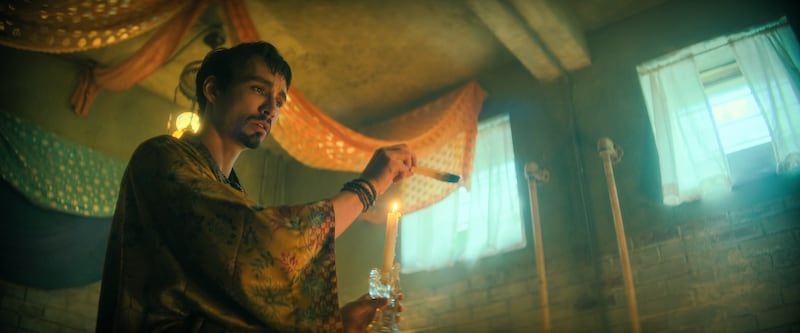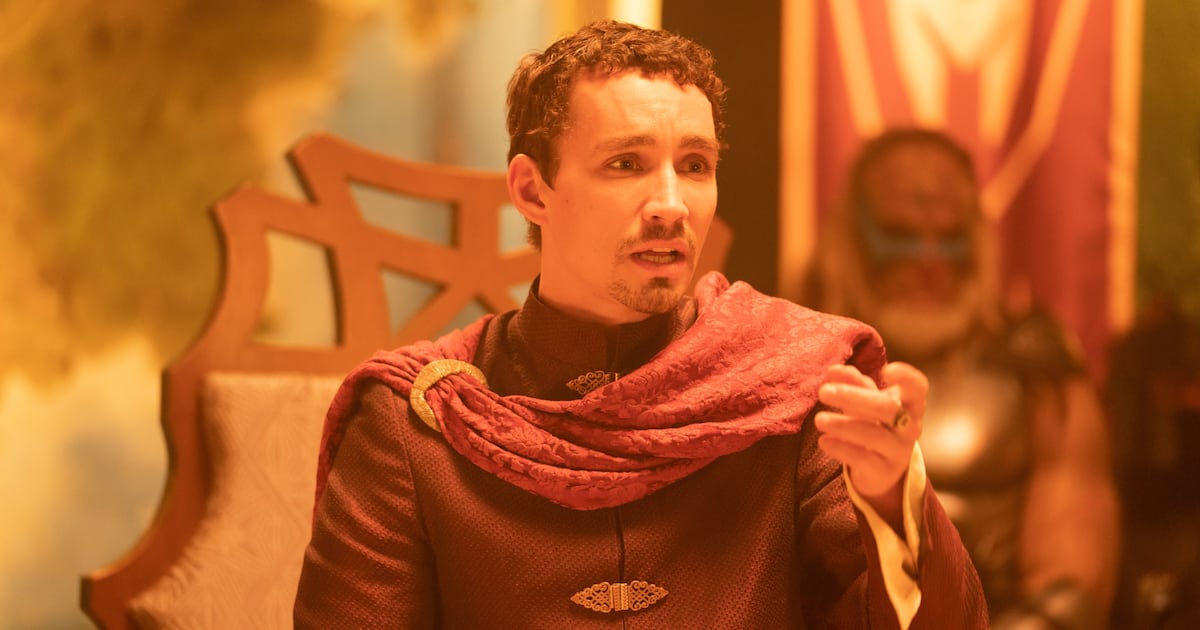“Fame only becomes real through how people react to you,” Robert Sheehan says. “I remember, during the pandemic, I was outside a pub in south Dublin and a guy said, ‘You’re as big as Cillian Murphy now.’ And I thought, oh wow, wasn’t expecting that – this is different.”
You can see how that might have happened. Sheehan, still lean and charismatic in his mid-30s, has had a helter-skelter career. In Britain the Laois man gained early attention for his turn as a rent boy in Red Riding, the 2009 adaptation of David Peace’s hard-boiled crime tetralogy, before scoring a Bafta nomination with his turn as the irreverent Nathan in the science-fiction romp Misfits.
His performance as a hitman in Love/Hate, RTÉ’s hugely popular gangster epic, solidified his reputation in Ireland. His role as Klaus, a queer, drug-addicted clairvoyant, in Netflix’s The Umbrella Academy was, however, another level up.
Across four seasons the superhero show was watched by an estimated 45 million households. At conventions he’s frequently approached by viewers who found Klaus’s journey affirming and personally significant. It was a phenomenon.
“It’s a bit of a strange one,” Sheehan says. “Love/Hate made me very famous in Ireland – a microcosm of fame. But Umbrella Academy was global.”
We talk as he reacquaints himself with the art of malign kingship. Having previously played Richard III in Trevor Nunn’s epic daylong production of War of the Roses – crafted from Shakespeare’s Henry VI and Richard III – the actor and writer can currently be found terrorising the peoples of Hyrkania in the latest big-screen outing for Marvel Comics’ Red Sonja.
Sheehan has a ball playing the ruthless Emperor Dragan opposite Matilda Lutz’s bikini-clad, sword-wielding heroine.
“I loved the idea of playing this kind of villain,” Sheehan says. “Just chewing up the sets and scenery, really having fun with it. The baddie is always a fun one to play. You can really add colour, abandon the moral compass, and go big.
“It was also interesting to be this supervillain who’s cutting down swathes of fantastical forest, especially since I’m always banging on about the environment online. That had a certain irony I liked.”
 Robert Sheehan as Klaus Hargreeves in The Umbrella Academy. Photograph: Netflix
Robert Sheehan as Klaus Hargreeves in The Umbrella Academy. Photograph: Netflix
Red Sonja’s journey from page to screen has been fraught. First appearing in Marvel Comics in 1973 (inspired by the pulp characters of Robert E Howard, the Conan the Barbarian creator), she debuted on film in 1985, in an eponymous movie starring Brigitte Nielsen and Arnold Schwarzenegger.
Despite a cult following, the film was a critical and commercial failure, stalling plans for sequels. Over subsequent decades, multiple reboot attempts faltered. In the 2000s Robert Rodriguez announced a version starring Rose McGowan, but it was scrapped after McGowan suffered nerve damage.
Various directors, including The Expendables’ Simon West and Bryan Singer, were later attached, but they left amid controversies, copyright tussles or production setbacks. Both Amber Heard and Hannah John-Kamen were linked with the title role before the British director MJ Bassett cast Lutz, the breakout star of Revenge, Coralie Fargeat’s film from 2017, in this 2025 reboot.
“It was great fun,” Sheehan says of the long-delayed action film. “The sets were beautifully built. Nu Boyana Film Studios, in Bulgaria, is great at that. We had smelly-looking peasants, full-size villages. There was even a whole set that didn’t make it into the final film.”
Red Sonja, as scripted by Tasha Huo, the showrunner on Tomb Raider: The Legend of Lara Croft, follows the titular gladiatrix from childhood, when her Hyrkanian village is destroyed, leaving the orphaned girl to climb trees and worship the forest goddess Ashera.
Years later she encounters brutal mercenaries who butcher and capture animals for Dragan’s gory spectacles. Attacking the interlopers in defence of the forest, she’s captured and forced into the arena as a slave warrior, and well placed to lead a rebellion against the tyrannical ruler.
Acting is spiritual in a way. It’s about facing fear, letting go and seeing what emerges
“It’s a big muscular thing,” Sheehan says. “I had definitely heard of the 1985 movie through the cultural hive mind. I hadn’t seen it. But I read the script, and I thought it was a really compelling example of a good-versus-evil, swords-and-sorcery movie. Fair play to MJ Bassett. She gave the film some class and a big emotional ending.”
Though no great age, Sheehan can call himself a veteran, with film credits dating back to Song for a Raggy Boy, from 2003. He was born in Portlaoise to, unsurprisingly, a family supportive of creativity: his father was a Garda with a passion for literature; his brother Brendan is a builder and former Mr Ireland.
Robert’s mother played a key role in nurturing his early interest in acting, ferrying him to auditions in Dublin, Belfast and Waterford. His early exposure to music and performance included trips to Fleadhanna Cheoil and even a town-twinning visit to France at the age of 10 as part of a musical group. These formative experiences sparked his passion for performance.
“As a child it gave me this almost religious joy, making people laugh, getting a reaction. It was addictive,” he says. “It’s different now. Now I realise that seeking approval can’t be the reason you act. It has to be about something deeper – discovery, surrender, exploration.
“Acting is spiritual in a way. It’s about facing fear, letting go and seeing what emerges. And when something genuine pops out unexpectedly, God, there’s no better feeling.”
Sheehan has a complicated relationship with fame. While grateful for his opportunities, he has expressed discomfort with the lack of control celebrity brings, particularly the expectation to “be on” in public spaces.
[ Robert Sheehan: ‘I was a contrarian f**ker. I thought it made me seem more edgy’Opens in new window ]
“I went through a period of rejecting that,” he says. “Fame felt final and kind of scary. People were looking at me with a different energy: ‘Quick, let’s get a photo, he’s current.’ I had to remind myself: I’ve worked for this all my adult life. Why am I suddenly afraid of it?
“Meditation really helped. Just sitting, letting those thoughts rise, helped me figure out why I was pushing it away. Now I’ve found a balance. Fame doesn’t feel like a social handicap any more.”
Sheehan’s move towards reflective contemplation has dovetailed with his diversifying into writing. His first book, Disappearing Act, was a collection of darkly comic stories showcasing, among other things, the imagined sex life of Medusa and the inner monologue of a garda with irreverent wit.
His second book, Playing Dead: How Meditation Brought Me Back to Life, offers a disarming personal journey into meditation, a process that began during a difficult period while filming the 2018 thriller Bad Samaritan in Oregon.
The memoir is a candid exploration of a destructive cycle that took in casual sex and excessive drinking. It also includes recollections of crying during a silent retreat in Bali and inner turmoil at a six-day retreat in Spain.
In recent years Sheehan has traded his former addresses in London and Los Angeles for west Co Cork. It’s a sort of homecoming. His mother is from the area, which was a long-standing holiday refuge for him before he relocated to Ballydehob.
“Living in Ireland helps with everything,” he says. “Everyone feels like they’ve known you forever. I love that. I prefer when people just come up and say, “All right, Robert?” instead of pretending not to notice you. That suits me.”
Red Sonja is available on DVD and Blu-ray

